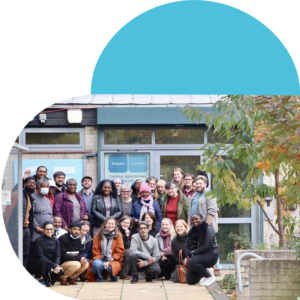
Our priority outcome: To reduce the number of people reaching crisis point and give prompt and appropriate support to people in crisis.
We can’t always prevent someone who’s getting mental health support from suffering a crisis, but the Alliance is developing new ways to help.

Context and key challenges
Too often, someone in a mental health crisis ends up in Accident and Emergency (A&E) or gets into a situation where they’re detained under the Mental Health Act for the safety of themselves or others. Arguably, any crisis indicates a failure of the system to support a person fully.
Following the pandemic and, more recently, the cost-of-living crisis, we’re seeing an increased demand for our support.
As the chart shows, 2023/24 saw a 25% increase in the number of mental health referrals to the Mental Health Liaison Team at St. Thomas’ A&E compared with the pre-pandemic year of 2019/20, a 56% increase since 2018/19.
The second chart shows that the proportion of people referred by A&E to a mental health bed, who came from outside Lambeth increased from around half in previous years to two thirds in 2023/24. Whilst many of these patients are from neighbouring boroughs a significant number are from outside South-East London or outside London or even from outside the UK. A growing proportion are also homeless and/or are not eligible for benefits. These factors mean it oftens takes longer to find them somewhere to stay once they’ve recovered from their mental health crisis.
What we offer
Care plans.
Our employees make sure that people who are already receiving mental health support have a care plan. This is a detailed document shared amongst the staff who support them and includes how to spot and what to do if they’re going into crisis.
Community based outreach Service.
Our community-based Crisis Outreach Service (COS) provides rapid face-to-face clinical assessments for people not currently receiving mental health support. People are usually referred to them by our Single Point of Access, but also by GPs, A&E and other healthcare colleagues.
Treehouse supported accommodation.
Our Treehouse supported accommodation provides 24/7 care for people who would otherwise be stuck in an acute hospital bed. This helps them to recover and be well enough to move on and live in more independent housing.
24-Hour Mental Health Support Line
The South London and Maudsley 24-Hour Mental Health Support Line is a resource for anyone needing advice, help and assistance with their own mental health or the mental health of someone they support.
Freephone: 0800 731 286.
Solidarity in a Crisis’ peer support line
This helpline is staffed by people with lived experience of mental health issues and operates out of hours.
Freephone: 0300 123 1922
www.certitude.london/what-we-do-2/solidarity-in-a-crisis
Evening Sanctuary
Mosaic Clubhouse’s Evening Sanctuary is a friendly, informal space that helps people who might otherwise attend A&E.
www.mosaic-clubhouse.org/sanctuary
Our impact
Crisis Outreach Service
The Crisis Outreach Service received 218 new referrals in 2023/24, 73 (50%) more than the previous year.
Tree House (24-7 supported housing)
The Treehouse saved 1,957 days in an acute bed in 2023/24, a saving of around £1m, whilst providing less restrictive support in a more familiar setting to 74 people.
Evening sanctuary
The Evening Sanctuary, which supports people who might otherwise attend A&E, had 1,583 attendances (a 43% increase from the previous year) from 260 people in 2023/24. 856 of these Evening Sanctuary attendances specifically avoided an A&E attendance (26% more than the previous year), saving at least £350k. More importantly, this enabled those people to avoid the stress of an A&E attendance and the possibility of ending up as an inpatient in an acute mental health bed.

Our next steps
We’re reviewing the Evening Sanctuary to see how we can build on its success. For example, we’d like to provide clinical support, such as a psychologist and/or psychiatrist, to allow more people to be referred into this service, and ideally for people to be able to attend without needing to be referred.
We will continue to review our support to people we already work with to make sure they have a crisis plan in place to reduce the possibility of crisis wherever possible. And we will also continue to work with, and more routinely involve carers in our support. As we know that carers usually know the person best and can spot signs of decline earlier than we can.
Can you help us?
We have a short survey that anyone who use our services is invited to complete. It will take less than three minutes and will tell us how well we are doing and what we need to improve.